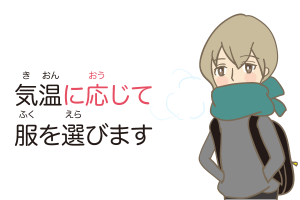We have entered the parts of speech section again. You have the basic knowledge already and thus we would like to introduce some advanced topics here. If you have difficulty understanding it, please review the related basic grammar. In this lesson, you will learn the concept of omission of particles.
How Omissions of Particles Work in Conversation
| Table of Contents Omissions of the Particle が, を, に , and へ The Controversial Topic: は VS. が Supplementary Learning: は VS. が in Subordinate Clauses |
As we often mention, omissions have a very important role in Japanese grammar. When contexts clearly tell what or whom you are referring to, parts of speech such as subjects and objects should be omitted. Otherwise, your speech would sound unnatural. In practice, especially in conversation, omissions can be applicable for particles, too. This is one of the keys to making natural expressions. Let’s check out how it works.
Omissions of the Particle が, を, に , and へ
Particles that can be omitted are already determined, which are the particles が, を, に, and へ. Other particles should not be omitted. Here are some examples (*Keep in mind: omissions can happen only in conversation).
The Particle を
| これから何を(する / しますか)? What will [we] do from now? |
| バスケットボールを(しよう / しましょう)。 Let’s play basketball. |
| ボールを持って(いる / いますか)? Do [you] have a ball? |
When the particle を indicates direct objects, it can be omitted. In practical conversation, sentences without the particle を may sound more natural than ones with the particle を.
The Particle に and へ (Direction of Motion and Destination)
| 明日はどこに(行く / 行きますか)? As for tomorrow, where will [we] go? |
| 映画館に(行かない / 行きませんか)? Won’t [you] go to theater [with me]? |
| 交差点を右へ曲がって(ください)。 Please turn right at the crossroad. |
| 海の方へ(行く / 行きます)よ。 [I] will go in the direction of the sea. |
When the particle に and へ indicate directions of motion or destination, they can be omitted, i.e. you cannot omit the particle に when it works with other function such as targets, and specific time. Here, both sentences with and without the particles sound natural.
The Particle が
| バスが(来た / 来ました)よ。 The bus has come. |
| 部屋に蜂が(いる / います)よ。 There is a bee in the room. |
Both sentences sound natural with or without the particle が. We will dig deep into the particle が along with the controversial topic of は VS. が later.
Multiple Omissions
| 田中さん_井上さん_怒ったらしい(です)よ。 |
With the above example, the two particles が and を have been omitted. How do you interpret that? There are two possible translations: “Tanaka-san got angry with Inoue-san” and “Inoue-san got angry with Tanaka-san.” The answer is the former one. When multiple omissions happen, you have to interpret the sentence based on the basic word order.
[adsense]
The Controversial Topic: は VS. が
Omission of particles is deeply involved with the controversial topic of は VS. が. Taking this opportunity, we would like to clarify any doubts you may have about it.
Basic Functions
| は | が |
| Set a topic Express contrast – |
Set a subject Express new information Identify something or someone |
That’s simpler than you thought, isn’t it? Let us emphasize an important fact again: topics and subjects are different in Japanese grammar. Taking this sentence: 日本はごはんが美味しい as an example, “美味しい: delicious” is the predicate and the corresponding subject is “ごはん: meals.” 日本 is just the general topic. We believe that you have no doubt about は VS. が in this structure. The choice for は and が is difficult only when topics and subjects are the same like “日本_アジアの国だ (Japan is an Asian country).” By following the same way of thinking below, you can figure out the proper particle.
1. Use が When You Try to Identify Someone or Something
| 誰が先生(なの / なんですか)? Who is a teacher? |
| 山田さんが先生(だ / です)よ。 Yamada-san is a teacher. |
2. Use が When You Express New Information
| タクシーが(来た / 来ました)。 A taxi has come. *when a taxi appears from a corner. |
| 雨が降って(いる / います)。 It’s raining. *When you have opened a window. |
3. Use は When You Express Contrast
| バスは来て(いない / いません)。 A bus has not come. *Contrast with the above. |
| 雪は降って(いない / いません)。 It’s not snowing. *Contrast with the above. |
4. Use は in Neither of the Above Three Cases
| 日本はアジアの国(だ / です)。 Japan is an Asian country. |
| 私は中国人じゃ(ない / ありません)。 I’m not Chinese. |
Zero Particle
This is the main topic. Considering the function of は and が, there are some cases in conversation where both は and が are not suitable. If that is the case, you have to omit particles.
| A: これからボブが遊びに来るよ。 Bob will come [here] to hang out from now. |
| B: いいね。早く来て欲しいね。 Sounds good. [I] want [him] come soon. |
| A: あっ、ボブ は・が 来たよ。 Ah, Bob has come (*Said when Bob has appeared). |
The third line is the case where both は and が are not suitable. The possible choice was が because Mr. A has noticed that Bob has arrived, i.e. that’s new information. However, since the third line is said while they are conscious that Bob will come before long, it is difficult to define that’s new information. Therefore, the natural expression is あっ、ボブ来たよ.
| A: この時計 は・が かっこいいと思う? Do you think this watch is cool? |
| B: うん、かっこいいと思うよ。 Yes, I think it’s cool. |
Here, the first line is another case where は and が are not suitable. The possible choice was は because you didn’t try to identify something or express new information. However, if you use は, your speech may indicate contrast like, “other watches are not cool, but this one is cool, isn’t it?” Thus, if you plainly ask whether the watch is cool or not, you omit particles, i.e. この時計、かっこいいと思う?
This omission often happens when the context clearly shows what the topic is. One of the typical situations is setting yourself or your listeners as a topic. Since the context already shows what the topic is, the particle は will indicate contrast.
| 私は来週東京に行くよ。 => Not very natural |
| 私、来週東京に行くよ。=> Natural |
| 来週東京に行くよ。 => Natural |
Unless there are people who won’t go to Tokyo next week, you should omit は or the whole subject.
Supplementary Learning: は VS. が in Subordinate Clauses
The general rule is that が should be used in subordinate clauses. However, in the following cases, you can also use は.
1. When は is Used for Contrast
| 寿司は美味しいけど、納豆は美味しくない(です)。 Sushi is delicious, but Natto is not delicious. |
| これは面白いけど、あれは面白く(ない / ありません)。 This is interesting, but that is not interesting. |
2. When a Main and a Subordinate Clause Have the Same Subject
| 寿司は美味しくて、売り切れ(た / ました)。 The sushi was delicious and was sold out. |
| このマンガは面白くて、有名に(なった / なりました)。 This manga was interesting and became popular. |
3. When a Subordinate Clause Expresses Reasons for Main Clauses
| 明日は日曜なので、買い物に(行く / 行きます)。 Since tomorrow is Sunday, [I] will go shopping. |
| 明日は休みだから、野球を(する / します)。 Since tomorrow is a day off, [I] will play baseball. |
Summary
- The particles が, を, に, and へ can be omitted in conversation.
- There are some cases where both は and が are not suitable, i.e. zero particle.
Understanding of the proper usage of particles is the key to mastering Japanese language. In spite of the important role, it is often omitted in conversation. Thus, you need to have a solid knowledge of the functions. We hope that this lesson has finally solved the issue of は VS. が. Next, you will learn a new type of verbs: compound verbs.

How to Express Conditions: によって, 次第で, に応じて, を問わず, にかかわらず, なしで, and なしに

Japanese Compound Verbs



